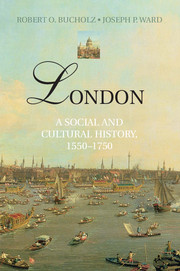Book contents
- Frontmatter
- Contents
- List of Illustrations and Maps
- List of Abbreviations and Conventions
- Acknowledgments
- Maps
- Introduction: London's Importance
- 1 London in 1550
- 2 The Socioeconomic Base
- 3 Royal and Civic London
- 4 Fine and Performed Arts
- 5 The Public Sphere and Popular Culture
- 6 The People on the Margins
- 7 Riot and Rebellion
- 8 Plague and Fire
- Conclusion: London in 1750
- Notes
- Further Reading
- Index
- Plate Section
Introduction: London's Importance
Published online by Cambridge University Press: 05 November 2012
- Frontmatter
- Contents
- List of Illustrations and Maps
- List of Abbreviations and Conventions
- Acknowledgments
- Maps
- Introduction: London's Importance
- 1 London in 1550
- 2 The Socioeconomic Base
- 3 Royal and Civic London
- 4 Fine and Performed Arts
- 5 The Public Sphere and Popular Culture
- 6 The People on the Margins
- 7 Riot and Rebellion
- 8 Plague and Fire
- Conclusion: London in 1750
- Notes
- Further Reading
- Index
- Plate Section
Summary
Between 1550 and 1750, London became Europe's largest city, a world-bestriding economic and cultural center, and the crucible for many of the hallmarks of modern life. This book presents London's history during the period when it rose to global prominence and came to dominate the economic, political, social, and cultural life of the British Isles as never before, nor, it will be argued, since. London: A Social and Cultural History, 1550–1750 synthesizes recent work in urban history, testimony by contemporary Londoners and tourists, and fictional works in which the city plays a part to trace London's rise, its role as a harbinger of modernity, and the ways in which its inhabitants coped with those achievements. One of those inhabitants, Samuel Johnson (1709–1784), famously said “there is in London all that life can afford.” Indeed, to evoke the full range of Londoners’ experience, it is necessary to traverse the whole of the metropolis, from the splendid galleries of Whitehall and St. James's to the damp and sooty alleys and courts of the City outparishes, along the way braving the dangers of plague and fire; witnessing the spectacles of the lord mayor's pageant and the hangings at Tyburn; and taking refreshment in the city's pleasure gardens, coffeehouses, and taverns. Having spent some years making this trek ourselves, the authors trust confidently that, at its end, readers will find themselves, to echo Johnson again, no more tired of London than they are tired of life.
London's Importance
In 1550, as this book opens London was already the most prominent city in England, containing its principal harbor; its largest concentration of population, wealth, and culture; and its capital, in suburban Westminster. But England, sitting on the periphery of Europe, the military equivalent of Denmark, the economic inferior of Flanders, was not a terribly important country. In fact, it could be argued that London's greatest significance in 1550 was as the funnel through which the ideas and products of other, more powerful European states passed into England. Two centuries later, much had changed. London was still the seat of government and greatest city in England, but England was now the dominant country in the British Isles, a leading player in Europe, and the proprietor of a worldwide empire. Indeed, by the end of the Seven Years’ War in 1763, the Union Jack flew from Canada to India, and from Gibralter to Tahiti.
- Type
- Chapter
- Information
- LondonA Social and Cultural History, 1550–1750, pp. 1 - 32Publisher: Cambridge University PressPrint publication year: 2012
- 1
- Cited by



